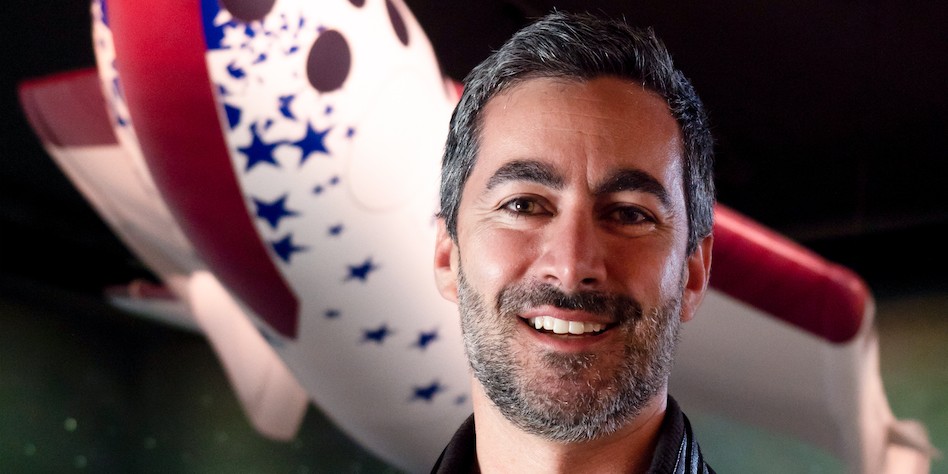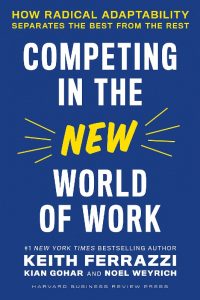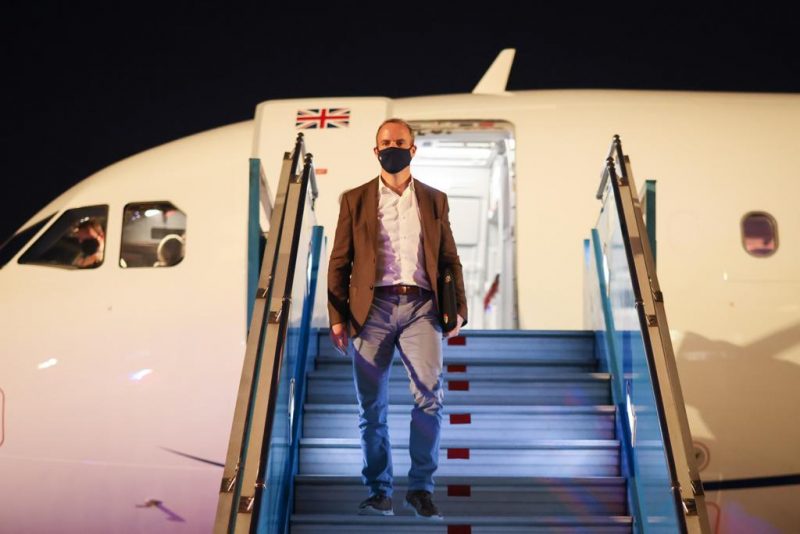Entrepreneur and MSc International Relations graduate (MSc IR 2000) Kian Gohar has recently co-written a book ‘Competing in the New World of Work‘ (Harvard Business Review 2022). Below he talks about his book and how studying IR led him to become a published author.

Kian Gohar (MSc International Relations 2000)
I never thought I’d be a published author.
Certainly not after an exhausting year as a graduate student reading dozens of books and spending hundreds of hours researching at the British Library and toiling to write my masters thesis in international relations. I was done with research and writing.
And that remained true for two decades. Until the pandemic made me write.
In the spring of 2020 as the world of business was experiencing a cataclysm, it became obvious that professional life would never be the same again. Instead of thinking about going back to work, I wondered, shouldn’t we be thinking of going forward to work?
And so over the last 18 months, I undertook a major research project where our team interviewed over 2000 top global executives to understand how they were leading to success during the turmoil of the pandemic.
And the end result is my new book Competing in the New World of Work published recently by Harvard Business Review.
Instead of thinking about going back to work, I wondered, shouldn’t we be thinking of going forward to work?
When I graduated LSE in 2000 with an MSc in International Relations, I faced numerous enticing career paths: pursuing a diplomatic career through the US State Department; working for the world’s most prestigious investment bank and facilitating international business transactions; or joining an upstart venture capital firm to foster new businesses that could change the world.
As an IR student, I was most interested in how we could reduce conflict. My graduate research showed that one of the main driving forces for social conflict is a lack of resources and inequitable distribution of opportunities and work. So I came to believe that the best way to promote peace was to build strong economic foundations and promote entrepreneurship as a tool for broad-based development, equitable growth, jobs and opportunity for all.
And so you can probably guess which path I chose after LSE.
As an IR student, I was most interested in how we could reduce conflict.
I joined a brand new venture capital firm based in London to help fund and scale new startups that could transform the world and create new jobs. It was the height of the dotcom era, and my friends were aghast at my decision to reject an offer from Goldman Sachs. But I knew that if I wanted to use the business world to positively impact the world, my career path would be necessarily untraditional.
Fast-forward a few years after working in London, and I won a Henry Luce Foundation fellowship to work in Shanghai for the first-ever Chinese venture capital fund. China was a very different world twenty years ago with unlimited opportunities for those with foreign expertise. And because of my graduate training at LSE, I was invited to develop and teach China’s first-ever graduate course on social entrepreneurship at CEIBS – China’s top business school. Just 25 years old, I jumped at the once-in-a-lifetime opportunity to help China’s future business leaders learn about entrepreneurship, innovation and impact. Through it, I quickly learned that teaching is the hardest and most rewarding work I’d ever done!
Desiring to develop my professional network in the US, I returned home and pursued an MBA at Harvard. After graduation, I yet again chose an unusual career path and turned down lucrative offers from name-brand firms. My friends thought I was crazy (Part 2). But I felt strongly that I first had to run a startup successfully on my own, before I could truly promote entrepreneurship as a tool of economic empowerment. So I joined a young startup in Florida that was transforming the sporting goods industry, using new technologies like cloud computing and direct-to-consumer ecommerce channels – years before these became mainstream business practice. Over five years, we scaled this tiny startup into the largest player in its niche space globally.
We created competitions to eradicate water scarcity, democratise access to literacy in underdeveloped communities, and develop new tech to accelerate up-skilling for marginalised workers
I knew the next career step would be to focus more on macro-level change. So in 2012, I joined a pioneering nonprofit called the XPRIZE Foundation in Los Angeles as an executive director. The XPRIZE creates large-scale incentive competitions to crowdsource genius and technology to solve humanity’s grand challenges. It is most well known for its first $10m competition to open outer space to private travel (which was won by a company whose technology ultimately became Virgin Galatic).
At its core, the XPRIZE seeks to leverage the power of markets, technology, and innovation to solve big problems for humanity. During my tenure, we created competitions to eradicate water scarcity, democratise access to literacy in underdeveloped communities, and develop new tech to accelerate up-skilling for marginalised workers, just to name a few grand challenges we explored and problem-solved. Collectively, I believe these levers raise our level of societal abundance and mitigate the potential for a scarcity mindset that can often lead to social conflict.
After a few years, I got the entrepreneurial itch again and launched my own innovation research and leadership training firm called Geolab. When the pandemic hit, we focused all our efforts to understand how the world of business was rapidly changing because of the public health crisis, new social movements, and shifting consumer expectations.
Disasters not only destroy, they also reveal the weaknesses in human structures. And this disaster made it clear that the way we were working, wasn’t really working for a long time. And we needed a roadmap to lead in this new era.
And that’s what brought me to research the future of work. Disasters not only destroy, they also reveal the weaknesses in human structures. And this disaster made it clear that the way we were working, wasn’t really working for a long time. And we needed a roadmap to lead in this new era.
 So together with my dear friend Keith Ferrazzi, we interviewed 300 global companies and identified the key leadership traits that teams need to master in this post-pandemic era: how to increase innovation and inclusion to build resilient teams that can see around corners and achievable remarkable results in uncertainty.
So together with my dear friend Keith Ferrazzi, we interviewed 300 global companies and identified the key leadership traits that teams need to master in this post-pandemic era: how to increase innovation and inclusion to build resilient teams that can see around corners and achievable remarkable results in uncertainty.
We compiled all this research into our new book, and I’m excited to share the practical lessons learned over the last 2 years of the pandemic, and help make the future of work more purposeful, innovative, and inclusive.
By doing so, I hope to inspire other leaders to lead with abundance and inclusion to lift all boats, and transform how we work. From Houghton Street to Harvard Business Review, I’ve come full circle: to study the causes of things, and promote solutions that create more abundant futures for all.
From Houghton Street to Harvard Business Review, I’ve come full circle: to study the causes of things, and promote solutions that create more abundant futures for all.
Visit our Alumni webpage to find out more about our community
Check out other Alumni news on our blog
This article represents the views of the author, and not the position of the Department of International Relations, nor of the London School of Economics.



